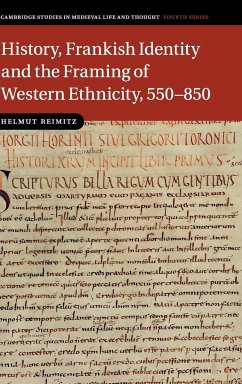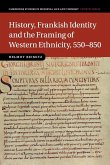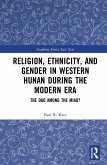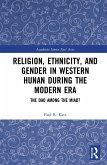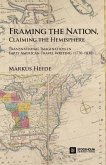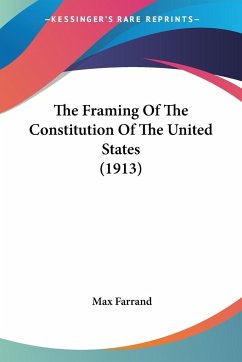Helmut Reimitz
History, Frankish Identity and the Framing of Western Ethnicity, 550-850
Helmut Reimitz
History, Frankish Identity and the Framing of Western Ethnicity, 550-850
- Gebundenes Buch
- Merkliste
- Auf die Merkliste
- Bewerten Bewerten
- Teilen
- Produkt teilen
- Produkterinnerung
- Produkterinnerung
This pioneering study explores medieval Frankish identity as a window into the formation of a distinct Western conception of ethnicity.
Andere Kunden interessierten sich auch für
![History, Frankish Identity and the Framing of Western Ethnicity, 550-850 History, Frankish Identity and the Framing of Western Ethnicity, 550-850]() Helmut ReimitzHistory, Frankish Identity and the Framing of Western Ethnicity, 550-85044,99 €
Helmut ReimitzHistory, Frankish Identity and the Framing of Western Ethnicity, 550-85044,99 €![Framing narratives of the Second World War and Occupation in France, 1939-2009 Framing narratives of the Second World War and Occupation in France, 1939-2009]() Framing narratives of the Second World War and Occupation in France, 1939-200935,99 €
Framing narratives of the Second World War and Occupation in France, 1939-200935,99 €![Religion, Ethnicity, and Gender in Western Hunan during the Modern Era Religion, Ethnicity, and Gender in Western Hunan during the Modern Era]() Paul R. KatzReligion, Ethnicity, and Gender in Western Hunan during the Modern Era66,99 €
Paul R. KatzReligion, Ethnicity, and Gender in Western Hunan during the Modern Era66,99 €![Religion, Ethnicity, and Gender in Western Hunan during the Modern Era Religion, Ethnicity, and Gender in Western Hunan during the Modern Era]() Paul R. KatzReligion, Ethnicity, and Gender in Western Hunan during the Modern Era200,99 €
Paul R. KatzReligion, Ethnicity, and Gender in Western Hunan during the Modern Era200,99 €![Framing the Nation, Claiming the Hemisphere Framing the Nation, Claiming the Hemisphere]() Markus HeideFraming the Nation, Claiming the Hemisphere43,99 €
Markus HeideFraming the Nation, Claiming the Hemisphere43,99 €![The Framing Of The Constitution Of The United States (1913) The Framing Of The Constitution Of The United States (1913)]() Max FarrandThe Framing Of The Constitution Of The United States (1913)32,99 €
Max FarrandThe Framing Of The Constitution Of The United States (1913)32,99 €![Framing the Mahabharata Framing the Mahabharata]() Saikat K BoseFraming the Mahabharata38,99 €
Saikat K BoseFraming the Mahabharata38,99 €-
-
-
This pioneering study explores medieval Frankish identity as a window into the formation of a distinct Western conception of ethnicity.
Hinweis: Dieser Artikel kann nur an eine deutsche Lieferadresse ausgeliefert werden.
Hinweis: Dieser Artikel kann nur an eine deutsche Lieferadresse ausgeliefert werden.
Produktdetails
- Produktdetails
- Verlag: Cambridge University Press
- Seitenzahl: 528
- Erscheinungstermin: 9. Februar 2016
- Englisch
- Abmessung: 235mm x 157mm x 33mm
- Gewicht: 907g
- ISBN-13: 9781107032330
- ISBN-10: 1107032334
- Artikelnr.: 42398397
- Herstellerkennzeichnung
- Produktsicherheitsverantwortliche/r
- Europaallee 1
- 36244 Bad Hersfeld
- gpsr@libri.de
- Verlag: Cambridge University Press
- Seitenzahl: 528
- Erscheinungstermin: 9. Februar 2016
- Englisch
- Abmessung: 235mm x 157mm x 33mm
- Gewicht: 907g
- ISBN-13: 9781107032330
- ISBN-10: 1107032334
- Artikelnr.: 42398397
- Herstellerkennzeichnung
- Produktsicherheitsverantwortliche/r
- Europaallee 1
- 36244 Bad Hersfeld
- gpsr@libri.de
Helmut Reimitz is Professor of History at Princeton University, New Jersey and studies the history of the Early Middle Ages in Europe, focusing on the social and political transformations of the Latin West from the end of the Roman Empire to the Carolingian Empire (c.4th-10th centuries). Before joining Princeton University in September 2008, he was head of the Early Medieval Department at the Institute for Medieval Research, Austrian Academy of Sciences. He is a member of several international networks, such as the European Science Foundation Project on the 'Transformation of the Roman World', and 'Texts and Identities in the Early Middle Ages' (cooperation of the Universities of Cambridge, Sorbonne, Utrecht, Leeds and Vienna). He has published a number of volumes on the history of the early Middle Ages and its meaning for the history of Europe. His books include Cultures in Motion (with Dan Rodgers and Bhavani Raman, 2013), Vergangenheit und Vergegenwärtigung. Frühes Mittelalter und Europäische Erinnerungskultur (with Bernhard Zeller, 2009), Staat im frühen Mittelalter (with Stuart Airlie and Walter Pohl, 2006) and The Construction of Communities in the Early Middle Ages (with Richard Corradini and Max Diesenberger, 2003).
Introduction; Part I. Communities of the Middle Ground in Sixth-Century
Gaul: 1. Gregory of Tours and his genealogy of pastoral power in late
antique Gaul; 2. Virtutes sanctorum et strages gentium: 'The deeds of the
saints and the slaughters of the peoples' - the radicalisation of church
history; 3. The dangers of history; 4. Continuities and discontinuities:
Roman and Frankish alternatives to Gregory; 5. The politics of identity in
the Merovingian kingdoms of the sixth century; Part II. Countermyths: The
Search for Origins in the Merovingian Kingdoms: 6. The persistence of
Gregory's vision of community: the réécriture and reconfiguration of the
Histories in the seventh century; 7. Iocundus in fabolis et strenuus in
consiliis: Roman trickery and Frankish mythmaking in the Chronicle of
Fredegar; 8. ... sicut ceterae gentes - '... like the other peoples' - the
Liber historiae Francorum and the definition of the populus in the seventh
and eighth century; 9. Spielräume of Frankish identity in the long seventh
century; Part III. A Common Future: The Reforms of Frankish Identity under
the Carolingians: 10. Gens Francorum inclita: 'the illustrious Frankish
people' - the centralisation of Frankishness under the early Carolingians;
11. Correctio: the redefinition of central Frankishness; 12. Before and
after 800: central and local Frankishness in the Carolingian world; 13.
Before and after 829: the transformation of Frankish identity from the
short to the long history of the Royal Frankish Annals; Conclusion:
Frankish identity, Western ethnicity; Bibliography; Index.
Gaul: 1. Gregory of Tours and his genealogy of pastoral power in late
antique Gaul; 2. Virtutes sanctorum et strages gentium: 'The deeds of the
saints and the slaughters of the peoples' - the radicalisation of church
history; 3. The dangers of history; 4. Continuities and discontinuities:
Roman and Frankish alternatives to Gregory; 5. The politics of identity in
the Merovingian kingdoms of the sixth century; Part II. Countermyths: The
Search for Origins in the Merovingian Kingdoms: 6. The persistence of
Gregory's vision of community: the réécriture and reconfiguration of the
Histories in the seventh century; 7. Iocundus in fabolis et strenuus in
consiliis: Roman trickery and Frankish mythmaking in the Chronicle of
Fredegar; 8. ... sicut ceterae gentes - '... like the other peoples' - the
Liber historiae Francorum and the definition of the populus in the seventh
and eighth century; 9. Spielräume of Frankish identity in the long seventh
century; Part III. A Common Future: The Reforms of Frankish Identity under
the Carolingians: 10. Gens Francorum inclita: 'the illustrious Frankish
people' - the centralisation of Frankishness under the early Carolingians;
11. Correctio: the redefinition of central Frankishness; 12. Before and
after 800: central and local Frankishness in the Carolingian world; 13.
Before and after 829: the transformation of Frankish identity from the
short to the long history of the Royal Frankish Annals; Conclusion:
Frankish identity, Western ethnicity; Bibliography; Index.
Introduction; Part I. Communities of the Middle Ground in Sixth-Century
Gaul: 1. Gregory of Tours and his genealogy of pastoral power in late
antique Gaul; 2. Virtutes sanctorum et strages gentium: 'The deeds of the
saints and the slaughters of the peoples' - the radicalisation of church
history; 3. The dangers of history; 4. Continuities and discontinuities:
Roman and Frankish alternatives to Gregory; 5. The politics of identity in
the Merovingian kingdoms of the sixth century; Part II. Countermyths: The
Search for Origins in the Merovingian Kingdoms: 6. The persistence of
Gregory's vision of community: the réécriture and reconfiguration of the
Histories in the seventh century; 7. Iocundus in fabolis et strenuus in
consiliis: Roman trickery and Frankish mythmaking in the Chronicle of
Fredegar; 8. ... sicut ceterae gentes - '... like the other peoples' - the
Liber historiae Francorum and the definition of the populus in the seventh
and eighth century; 9. Spielräume of Frankish identity in the long seventh
century; Part III. A Common Future: The Reforms of Frankish Identity under
the Carolingians: 10. Gens Francorum inclita: 'the illustrious Frankish
people' - the centralisation of Frankishness under the early Carolingians;
11. Correctio: the redefinition of central Frankishness; 12. Before and
after 800: central and local Frankishness in the Carolingian world; 13.
Before and after 829: the transformation of Frankish identity from the
short to the long history of the Royal Frankish Annals; Conclusion:
Frankish identity, Western ethnicity; Bibliography; Index.
Gaul: 1. Gregory of Tours and his genealogy of pastoral power in late
antique Gaul; 2. Virtutes sanctorum et strages gentium: 'The deeds of the
saints and the slaughters of the peoples' - the radicalisation of church
history; 3. The dangers of history; 4. Continuities and discontinuities:
Roman and Frankish alternatives to Gregory; 5. The politics of identity in
the Merovingian kingdoms of the sixth century; Part II. Countermyths: The
Search for Origins in the Merovingian Kingdoms: 6. The persistence of
Gregory's vision of community: the réécriture and reconfiguration of the
Histories in the seventh century; 7. Iocundus in fabolis et strenuus in
consiliis: Roman trickery and Frankish mythmaking in the Chronicle of
Fredegar; 8. ... sicut ceterae gentes - '... like the other peoples' - the
Liber historiae Francorum and the definition of the populus in the seventh
and eighth century; 9. Spielräume of Frankish identity in the long seventh
century; Part III. A Common Future: The Reforms of Frankish Identity under
the Carolingians: 10. Gens Francorum inclita: 'the illustrious Frankish
people' - the centralisation of Frankishness under the early Carolingians;
11. Correctio: the redefinition of central Frankishness; 12. Before and
after 800: central and local Frankishness in the Carolingian world; 13.
Before and after 829: the transformation of Frankish identity from the
short to the long history of the Royal Frankish Annals; Conclusion:
Frankish identity, Western ethnicity; Bibliography; Index.

